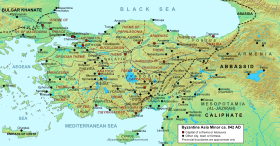Battle of Mauropotamos
| Battle of Mauropotamos | |||||||
|---|---|---|---|---|---|---|---|
| Part of the Arab–Byzantine Wars | |||||||
 Map of Byzantine Asia Minor and the Byzantine-Arab frontier region ca. 842 |
|||||||
|
|||||||
| Belligerents | |||||||
|
Abbasid Caliphate Emirate of Melitene |
Byzantine Empire | ||||||
| Commanders and leaders | |||||||
| Abu Sa'id Muhammad b Yusuf Umar al-Aqta |
Theoktistos | ||||||
The Battle of Mauropotamos (Greek: Μάχη τοῦ Μαυροποτάμου) was fought in 844, between the armies of the Byzantine Empire and the Abbasid Caliphate, at Mauropotamos (either in northern Bithynia or in Cappadocia). After a failed Byzantine attempt to recover the Emirate of Crete in the previous year, the Abbasids launched a raid into Asia Minor. The Byzantine regent, Theoktistos, headed the army that went to meet the invasion but was heavily defeated, and many of his officers defected to the Arabs. Internal unrest prevented the Abbasids from exploiting their victory, however. A truce and a prisoner exchange were consequently agreed in 845, followed by a six-year cessation of hostilities, as both powers focused their attention elsewhere.
Following the restoration of the veneration of icons in March 843, the Byzantine Empire's government, headed by the Empress-regent Theodora and the logothetes Theoktistos, embarked on a sustained assault on the Byzantines' main political and ideological foe, the Abbasid Caliphate and its dependencies. This aggressive stance was on the one hand facilitated by the internal stability that the end of the Iconoclasm controversy brought, and on the other encouraged by a desire to vindicate the new policy through military victories against the Muslims.
The first such campaign, an attempted reconquest of the Emirate of Crete led by Theoktistos in person, made initial gains, but ultimately ended in disaster. After scoring a victory over the Arabs in Crete, Theoktistos learned of a rumour that Theodora intended to name a new emperor, possibly her brother Bardas. Theoktistos hurried back to Constantinople, where he discovered that the rumour was false, but in his absence, the Byzantine army in Crete was routed by the Arabs.
...
Wikipedia
